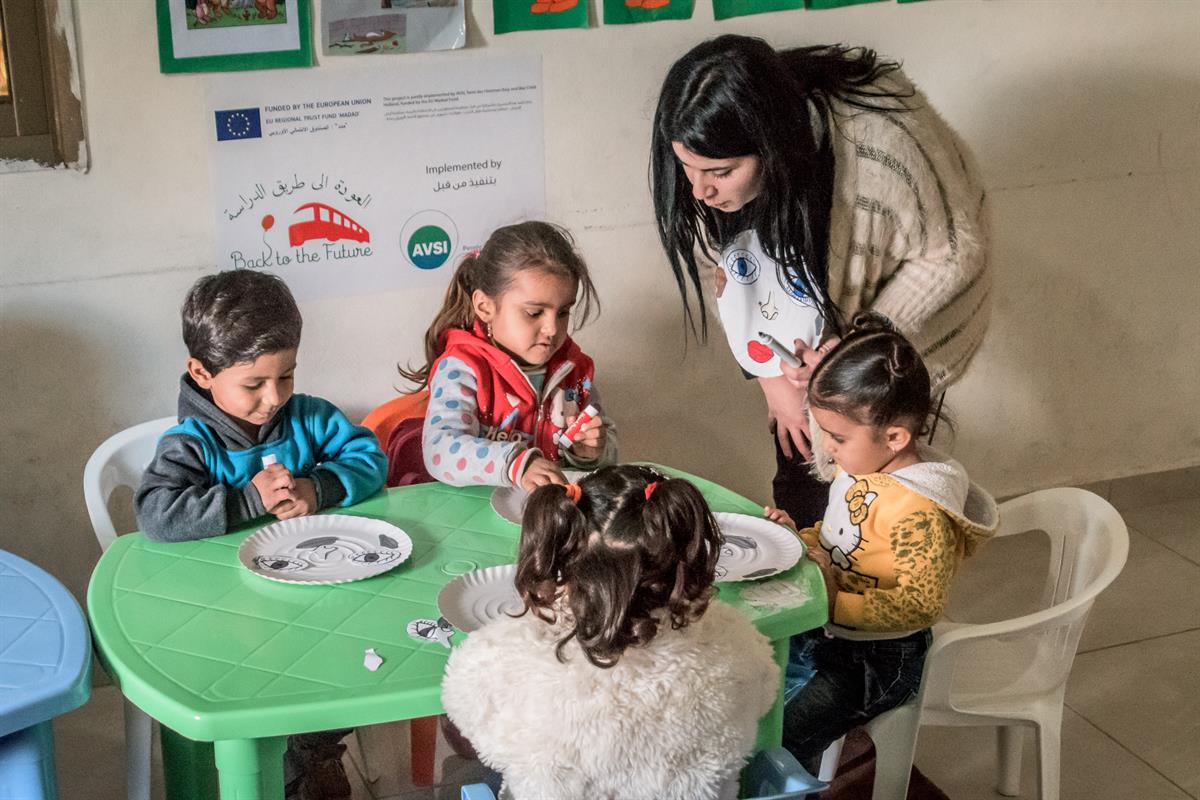As part of the follow-up of the Brussels III Conference "Supporting the Future of Syria and the Region", the European Union Regional Trust Fund (EUTF) in Response to the Syrian Crisis organized a partners’ event on the 12th and 13th of September 2019 “Lessons learnt from aid delivery within the humanitarian development nexus”. AVSI, as leading partner of the “Back to the Future” consortium, was present to share the lessons learnt and bring recommendations from the experience in Lebanon and Jordan to support the education of young Syrian refugees.
The conference was attended by approximately 150 cooperation professionals, including representatives of the European Union Delegations, United Nations, NGOs, INGOs, embassies and academic institutions. The purpose of the event was to contribute to learning around aid delivery with a development approach in protracted displacement situations.
The 3-years project “Back to the Future” was implemented by AVSI in partnership with Terre des Hommes Italy, Terre des Hommes Netherlands and War Child Holland. It was funded by the EUTF to promote enrolment and improve retention in the formal education system for Syrian refugee and vulnerable children from local communities in Lebanon and Jordan, and through the creation of suitable environment by rehabilitating public school buildings. The project supported formal and non-formal activities for pre-school and school-aged children (aged three to 17).

The Lebanese and Jordanian contexts showed that the first gap to fill is the integration of refugee students in national education systems. While the crisis surely posed several challenges in this respect, it also created opportunities to move from a short-term to a systemic response. Within Back to the Future, this was done by providing an essential service, referral from non-formal education (NFE) to formal education (FE). This benefited:
- children from non-formal education enrolled in formal education
- children from primary formal education to secondary and higher education
- out-of school children enrolled in school or receiving education.
To do so the consortium explored flexible strategies to increase the possibilities of referral or remove bottlenecks and alternative pathways: for example, in Lebanon mobile schools were working with out-of-school children and street children with the aim to educate and refer them to education. Also, school capacity was enhanced (maintenance and upgrading), and the capacity of the teachers built, while success stories were used to champion positive messages.
Also, the refugee crisis presented the opportunity to rethink the quality of education in Lebanon and Jordan. Within the Back to the Future project we learnt that improving systems, spaces and providing trainings can change class behavior and improve the quality of education. Many best practices have been learnt, including:
- incorporating Psycho Social Support (PSS) with counselors in schools
- teaching methodology reform in UNRWA (United Nations Relief and Works Agency for Palestine Refugees in the Near East) schools
- incorporating psychosocial support and integrating basic and skills education within Technical and Vocational Education Training
- incorporating Child Protection
- having a holistic approach (rehabilitation, capacity building, extracurricular activities, etc.)
One of the main lessons learnt and shared during the event is the importance of having a multisectoral and multi-stakeholder approach to work at policy level while respecting the system in place and making the most of the lessons learnt in the field. Secondly, the importance of bridging the gap between the school system and uppers and give a perspective thus making it clear that education is a necessary investment at multiple levels. In order to do so, it is essential to have a flexible approach and an efficient follow-up system for children in school and out of school.
Lebanon and Jordan have best practices in this sense with the “Accelerated Learning Program” by the Lebanese Ministry of Education and the UNICEF project “Makani approach in Jordan: integrating child protection, education, youth empowerment and psychosocial support for Syrian children”.
The Back to the Future experience also showed how to measure cost efficiency/cost effectiveness and achieve value for money in Education program design. The short-term and long-term outcomes have to be taken into account when budgeting activities. In this sense, the recommendation that was brought to the table is to move away from a program management that considers unit costs to a system that is integrated and multisectoral to address the multiple barriers for an accessible, qualitative and inclusive education. The testimony of AVSI at the EUTF conference brought the best practices of Lebanon where a joint procurement system is in place between Ministry of Education and Higher Education (MEHE) and Civil Society Organizations (CSOs) and of Jordan, where tax exemptions are applied for education supplies and inputs.
At the event the EU Trust Fund confirmed its commitment in fostering more self-reliance of refugees while at the same time assisting the countries and communities hosting them, taking into account the lessons learnt shared during the event.